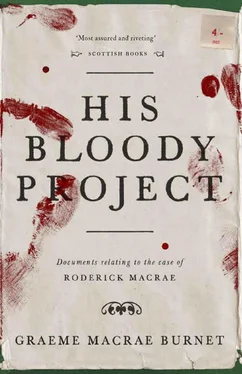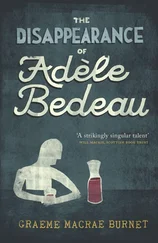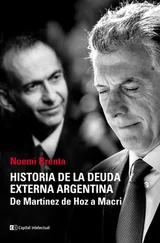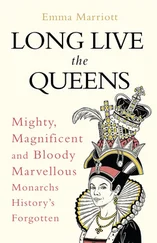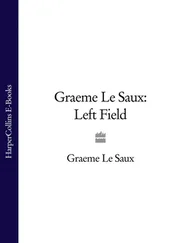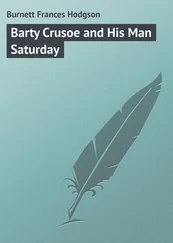Graeme Burnet - His Bloody Project
Здесь есть возможность читать онлайн «Graeme Burnet - His Bloody Project» весь текст электронной книги совершенно бесплатно (целиком полную версию без сокращений). В некоторых случаях можно слушать аудио, скачать через торрент в формате fb2 и присутствует краткое содержание. Год выпуска: 2015, Издательство: Contraband, Жанр: Современная проза, на английском языке. Описание произведения, (предисловие) а так же отзывы посетителей доступны на портале библиотеки ЛибКат.
- Название:His Bloody Project
- Автор:
- Издательство:Contraband
- Жанр:
- Год:2015
- ISBN:нет данных
- Рейтинг книги:5 / 5. Голосов: 1
-
Избранное:Добавить в избранное
- Отзывы:
-
Ваша оценка:
- 100
- 1
- 2
- 3
- 4
- 5
His Bloody Project: краткое содержание, описание и аннотация
Предлагаем к чтению аннотацию, описание, краткое содержание или предисловие (зависит от того, что написал сам автор книги «His Bloody Project»). Если вы не нашли необходимую информацию о книге — напишите в комментариях, мы постараемся отыскать её.
A brutal triple murder in a remote northwestern crofting community in 1869 leads to the arrest of a young man by the name of Roderick Macrae. There’s no question that Macrae is guilty, but the police and courts must uncover what drove him to murder the local village constable.
And who were the other two victims? Ultimately, Macrae’s fate hinges on one key question: is he insane?
His Bloody Project — читать онлайн бесплатно полную книгу (весь текст) целиком
Ниже представлен текст книги, разбитый по страницам. Система сохранения места последней прочитанной страницы, позволяет с удобством читать онлайн бесплатно книгу «His Bloody Project», без необходимости каждый раз заново искать на чём Вы остановились. Поставьте закладку, и сможете в любой момент перейти на страницу, на которой закончили чтение.
Интервал:
Закладка:
‘Gentlemen, these are complex issues about which you must reach your own conclusions. But I must introduce a note of caution. Mr Thomson’s opinion rests on a single piece of evidence — the nature of the injuries suffered by Miss Mackenzie — and his interpretation of the motives for inflicting these injuries. But this interpretation is no more than that. It is not fact. Mr Thomson was not a witness to the crimes and you are entitled to consider other interpretations of the evidence you have heard; in particular those parts of the evidence which suggest that the actions of Mr Mackenzie provided the prisoner with the motive for his assault. If you choose to disagree with Mr Thomson’s interpretation, you are entitled to consider his view that, if the true target of the prisoner’s assault was indeed Mr Mackenzie, he may, in view of his subsequent behaviour, be regarded suffering from an alienation of reason.’
The Lord Justice-Clerk here gave pause as if to allow the jurymen to digest this complex section of his summation.
‘However,’ he continued, ‘even were you to disagree with Mr Thomson’s view, this must be set against the totality of the evidence that has been put before you. It is not enough for you to think that no man could commit such heinous acts and be deemed to be in of sound mind. Sane men can and do commit such crimes, and the mere fact of committing such an act does not, in itself, place an individual outside the boundaries of reason. Regardless of your feelings in this matter, that is not the test in law. Your verdict must be reached solely through a dispassionate assessment of the evidence which has been presented to you in this court.’
The Lord Justice-Clerk concluded by reminding the jury of the solemnity of their task. ‘The charges before this court are of the very gravest nature and a guilty verdict will result in a capital sentence.’ He then thanked the jurymen for their close attention throughout the trial and charged them with delivering a verdict only after solemn consideration of the evidence.
The verdict
As it was by then after four o’clock, the Lord Justice-Clerk instructed the jury that if they had not reached their verdict by seven o’clock, they would be returned to the inn for the night and would resume their deliberations in the morning. He cautioned them that this constraint of time must form no part of their consideration and reminded them once more of the solemn nature of the task with which they were charged.
Roddy was taken downstairs and the court officials vacated the chamber. Not wishing to risk missing the climactic moment of the trial, those in the public gallery remained in their places, arguing among themselves with newly acquired legal expertise about the niceties of the case. The more worldly reporters retired en masse to the appropriately named Gallows Inn on Gordon Terrace, having first pressed shillings into the hands of waiting boys to fetch them if the bell was rung. Great quantities of wine and ale were ordered and drunk with alacrity, the presumption being that the jury would not be long in returning its verdict. The consensus was that, despite the valiant efforts of his advocate, Mr Thomson’s evidence had condemned the unfortunate prisoner to the gibbet. Only John Murdoch departed from the notion that the verdict was a foregone conclusion. His southern colleagues, he explained, overlooked the empathy the jurymen might feel towards an ill-used crofter. The resentment caused by centuries’ ill treatment of the Highlander was keenly felt, and in Roderick Macrae, they might see an individual who had revolted against the vindictiveness of the powers-that-be. Mr Philby listened with interest to the Nairnshireman’s opinions, but argued that the jury could not allow such sentiments, no matter how valid, to colour their thinking. Others merely derided Murdoch, arguing that his radical views had blinded him to the facts of the case.
As the clock on the wall of the inn moved towards half past six, the mood altered, however. Clearly the members of the jury had found something to discuss. Then at ten to seven, the boy-messengers burst in: the bell had been rung. The reporters scrambled for the door, throwing coins on the table as they went. They received an admonishing stare from the Lord Justice-Clerk as they were admitted to the press box. The court-room was in any case already in a tumult of anticipation. After silencing the room, the judge warned in the sternest terms against any disruptions to proceedings. Roddy was then brought up, his demeanour, wrote Mr Philby, ‘barely altered from his first appearance, although his head perhaps sat more heavily on his shoulders’. The jury was then brought in and the foreman, a tanner named Malcolm Chisholm, rose.
The Clerk of the Court asked if they had reached a verdict.
‘We have not,’ replied Mr Chisholm.
This statement was greeted with as great a uproar as an acquittal, and it required the macers’ expulsion of two individuals from the gallery for order to be restored.
The Lord Justice-Clerk commended the jury for the earnestness with which they were treating their task and instructed them re-convene in the jury-room at ten o’clock the following morning, adding that they should refrain from any dialogue about the case until that time.
The newspapermen once again decamped to the Gallows Inn, where the wine flowed ‘like the River Ness in spate’. Mr Philby later reflected that ‘the verdict which would only a short time before have seemed the most astonishing reversal, now seemed a great deal more likely’. If the jury had seeds of doubt in their minds, his logic went, these could only germinate overnight. He spent much of the evening in discussion with John Murdoch, who despite his previous statements, did not expect the verdict to be in the defendant’s favour. ‘Up here, we are too used to cowering before the authorities to go against the Crown,’ he told Mr Philby. In any case, even if the prisoner were to ‘jouk the gibbet’, a lifetime’s confinement in the General Prison under the supervision of Mr Thomson would be a dubious reward.
The evening degenerated into carousing, and Mr Philby confessed that he had ‘too freely taken advantage of the Highland hospitality’, so much so, that when roused by his landlady the following morning, he had no need to even re-tie his boots.
The public gallery was opened at ten o’clock. The fact that there was no more evidence to be heard had done nothing to diminish the numbers that gathered. Those who failed to gain entry remained outside the court building, wishing to be among the first to hear news of the verdict. Mr Philby and his colleagues loitered in the corridors of the court, nursing their hangovers with hipflasks. In the event, they did not have long to wait. At quarter past eleven, the bell was rung for the second time. Before the arrival of the jury, the Lord Justice-Clerk warned that he would not hesitate to empty the court-room if necessary, and, as if in deference to the solemnity of the moment, Roddy’s arrival was accompanied by an eerie hush. He was quite pale and his eyes were ringed with dark circles. Mr Sinclair, who looked similarly ashen, shook his hand. The jurymen then filed in. Roddy observed them, as if some interest in the proceedings had finally stirred in him. The men had a doleful air about them, as if taking their pews at a funeral. Not one of them met the prisoner’s eye. The Clerk of the Court rose and asked if they had reached a verdict. Mr Chisholm replied that they had.
The Lord Justice-Clerk put the question to them:
‘How say you, gentlemen, do you find the prisoner guilty or not guilty?’
Mr Sinclair bowed his head.
The foreman replied, ‘My lords, in respect of the first count, the jury finds the panel Guilty. In respect of the second count, we find the panel Guilty; and in respect of the third count we find the panel Guilty.’
Читать дальшеИнтервал:
Закладка:
Похожие книги на «His Bloody Project»
Представляем Вашему вниманию похожие книги на «His Bloody Project» списком для выбора. Мы отобрали схожую по названию и смыслу литературу в надежде предоставить читателям больше вариантов отыскать новые, интересные, ещё непрочитанные произведения.
Обсуждение, отзывы о книге «His Bloody Project» и просто собственные мнения читателей. Оставьте ваши комментарии, напишите, что Вы думаете о произведении, его смысле или главных героях. Укажите что конкретно понравилось, а что нет, и почему Вы так считаете.
